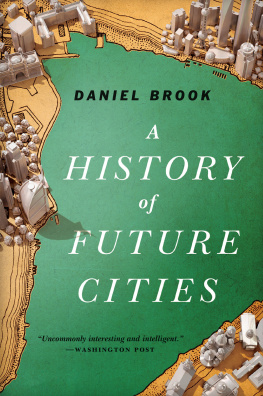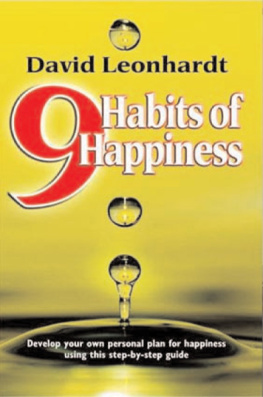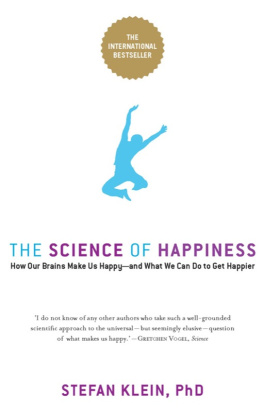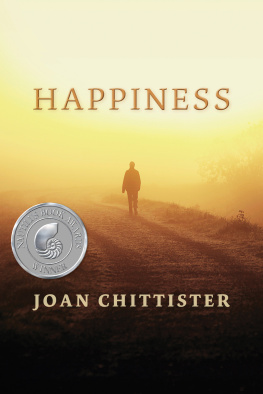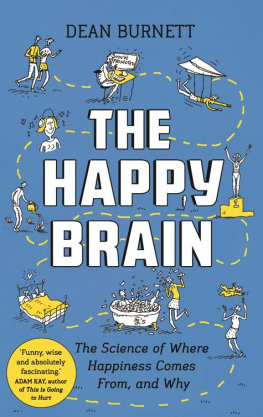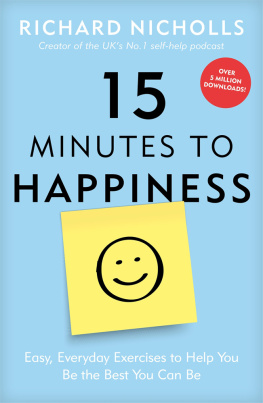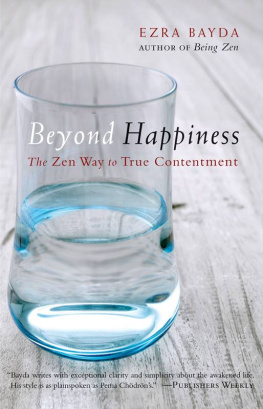Harboring Happiness
101 Ways To Be Happy
Dan Brook, PhD
Copyright 2021 Dan Brook
All rights reserved.
No portion of this book may be reproduced in whole or in part, by any means whatsoever, except for passages excerpted for the purposes of review, without the prior written permission of the publisher.
For information, or to order additional copies, please contact:
Beacon Publishing Group
P.O. Box 41573 Charleston, S.C. 29423
800.817.8480| beaconpublishinggroup.com
Publishers catalog available by request.
ISBN-13: 978-1-949472-32-5
ISBN-10: 1-949472-32-5
Published in 2021. New York, NY 10001.
First Edition. Printed in the USA.
Dedicated to all those already happy
to all those who want to be,
and to all those on the way.
Praise for Harboring Happiness
A delightful collection of essential practices to help us nourish our natural capacity for happiness. A gem of a book!
Tara Brach, PhD, author of Radical Acceptance and Radical Compassion
This is a fantastic, practical, and succinct summary of evidence-based and heartfelt, inspired ways to cultivate resilient well-being in stressful times. What a beautiful book!
Rick Hanson, PhD, author of Neurodharma: New Science, Ancient Wisdom and Seven Practices of the Highest Happiness
This is a wonderful, useful, and inspiring book. What Dr. Dan Brook reveals will change your individual mind and relationships. A delight for us all.
Dacher Keltner, PhD, Co-Director of the Greater Good Science Center at the University of California, Berkeley and author of Born to Be Good and co-author of Understanding Emotions
To be frank, I was a bit discomfited to see another book on happiness; particularly in this time of COVID. But this book is different. Dr. Brooks Harboring Happiness provides a kaleidoscopic tour that is as informative as it is a delight to read. Combining substantive evidence-backed commentary with witty and lucid prose, this book made me smile. I took solace not only in Dr. Brooks sound advice about happiness, but for its implications for a more meaningful life. So if youre searching for a richer, livelier, and more sustainable existence, this book is for you!
Kirk Schneider, PhD, President of the Existential-Humanistic Institute and author of The Spirituality of Awe and The Depolarizing of America: A Guidebook for Social Healing
Introduction
Y ou can be happy. You can also skip this introduction and go straight to the happiness techniques. Its your book, your life, and your rules. The choices are yours, too.
Mark Victor Hansen, co-author of the Chicken Soup for the Soul books, advises you to Dedicate yourself to the good you deserve and desire for yourself. Give yourself peace of mind. You deserve to be happy. You deserve delight. This is true no matter who or what or where you are!
Photo by Daniel Xavier
H appiness is a psychological and sociological skill even if there might also be biological, genetic, and neurological components. The interdisciplinary science of happiness teaches us that it is a set of skills you can learn, practice, increase, share, and enjoy.
Indeed, Sonja Lyubomirskys research in her The How of Happiness indicates that half our happiness may be due to genetics, only 10% to life circumstances, and 40%, the part we can control, to our thoughts and actions. Lyubomirsky writes that Our intentional, effortful activities have a powerful effect on how happy we are, over and above the effects of our [genetic] set points and the circumstances in which we find ourselves.
William Arthur Ward realized: Happiness is an inside job. Although there might not be a specific recipe for your happiness, there are a variety of ingredients for you to choose from and combine in this little book.
Stanford University researcher Emma Seppl discovered that we do not become happy because we are successful; we are more likely to be successful in anything because we are happy. When we value our happiness and also the happiness of those around us we become more productive, more focused, more resilient, more charismatic, and more influential not to mention more innovative, too., she explains. The ability to have fun improves our relationships, helping us connect with our colleagues, family, and friends more easily, and even makes us more attractive to others.
Writing about awe, which can increase our happiness, humanistic psychologist Kirk Schneider distinguishes between a quick boil of happiness and a slow simmer of joy. This dichotomy also arises in my A Sociology of Joy.
One does not need to be constantly happy an impossibility to have a joyful life. Whether we think of it as happiness, joy, bliss, excitement, contentment, wellbeing, or satisfaction, it has to be much more than a flash in the pan that quickly comes and goes. We should strive to make happiness a process and a lifestyle.
Albert Einstein preferred the joyous slow simmer: A calm and modest life bring much more happiness than constantly chasing success, which always involves constant restlessness. Likewise, French Tibetan Buddhist monk Matthieu Ricard, a former biochemist who has been described as the worlds happiest man, remarks that Happiness is not an endless succession of pleasurable feelings; its an exceptionally healthy way of living.
Also for Aristotle, happiness, just like excellence in anything , is not about a moment, thing, position, possession, event, feeling, hope, person, job, or distant promise. Based on Aristotles eudemonia, happiness is a process, a practice, a habit. To put it in the words of my LinkedIn acquaintance Felix Aiwekhoe: If you sow bitterness, you will harvest bitternessand if you sow happiness, you will harvest happiness.
Writing from prison during World War I, revolutionary Rosa Luxemburg recognized that When one has the bad habit of looking for a drop of poison in any blossom, one finds good reason, as long as one lives, to be moaning and groaning ... If you take the opposite approach, and look for the honey in every blossom, then youll always find reasons to be cheerful. Being miserable, sad, angry, resentful, etc. is as much a habit as being happy, cheerful, and content. In that vein, Googles Mo Gawdat, who wrote Solve for Happy , advises us to make happiness a priority and to develop happiness skills. I hope you find some here and put them to use.
Whatever your thoughts and feelings about happiness, here are 101 possible paths backed by science to help get you there.
Earn enough to cover all your needs and some wants
P eople are much more likely to be happy after they have their basic needs met, at least some of their wants, and a savings cushion for just-in-case scenarios. Decreased financial anxiety is likely to lead to increased happiness. However, happiness no longer increases with additional income or stuff (even awesome stuff) for people who live in wealthier countries. The opposite can be said for those in poorer countries.
Reggae singer Bob Marley offered invaluable insight: money is numbers and numbers never end. If it takes money to be happy, your search for happiness will never end. That said, people are happy and unhappy at all income levels in all countries, though people tend to be happier in more egalitarian countries with higher average incomes.


